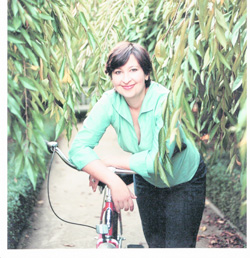| | Published September 17, 2008
| Lamorinda Reads: An interview with the author of "Funny in Farsi," Firoozeh Dumas
| | By Sophie Braccini |  | | Author Firoozeh Dumas Photo courtesy of Firoozeh Dumas |
Following last year's successful "Lamorinda Reads" program, featuring "Down To The Soundless Sea" by Thomas Steinbeck, the three Lamorinda libraries will soon invite our communities to share another book, have discussions and enjoy entertainment. Lamorinda Reads will kick off this year on October 13; the chosen prose is by American-Iranian author Firoozeh Dumas, "Funny in Farsi - A memoir of growing up Iranian in America." The book is the colorful depiction of Dumas' family's early experience in the United States, from day one, when her father thought it was a good idea for her mother to join her daughter in the 2nd grade classroom, when none of them spoke a word of English. The very funny tales are painted with the multi-faceted colors of emotion and are an excellent read for all ages. On a secondary level, they are a window on what it means to be a foreigner. Dumas' need to write came with motherhood. "My father was always a story teller," she said, "when I became a parent I knew all of my father's stories, but my children didn't know mine." When her first child reached kindergarten, she joined a writing group and started writing "Funny in Farsi." After initial difficulty finding an editor, the book quickly met with success. This title was on the San Francisco Chronicle and LA Times bestseller list and was a finalist for the PEN/USA award in 2004 and a finalist for the prestigious Thurber Prize for American humor. "To be authentic you have to write about your own experience," comments Dumas, "in my stories I am as honest as I can be." The young Persian woman has the gift to transform difficult memories into humor. "That's just the way it comes to me," she says, "of course being laughed at or lonely as a kid was painful, but as I grew up I saw the humor in it. As Mark Twain said, 'Humor is tragedy plus time.'" Dumas does not depict real tragedies, in her own terms it is more inconveniences that are turned into farce. Her first name, Firoozeh, is a good example. Many people had trouble pronouncing it and she heard everything from being called "Fritzy" in a doctor's waiting room, to a rather ungifted woman who decided to call her "F-word." Her representations are impressively lively, whether she talks of her mother, who could never completely master English, or her father's addiction to American freebies, or her elderly San Francisco neighbor during the 1989 earthquake. They all come alive and their common humanity is what Dumas captures, first with her heart, then with her writing. "When I arrived in the United States at age seven, it was really a foreign country and the differences just overwhelmed me," remembers Dumas, "then, I realized that these Americans were not that different from me. This is why I write, to portray the shared humanity amongst us all." Dumas believes that one of the reason for her success is that her stories are universal. "My experiences are those of anybody who is an outsider and wants to belong," she says, "puberty can be just as painful as being a foreigner." Nowadays Dumas is completely integrated in her community. Having been raised here by Iranians, she has kept her culture. "As an immigrant, one needs to hold on to their language and culture," she believes, "but assimilation is important too, otherwise you end up cheating yourself." When she comes to Lamorinda for the Grand Finale event of the Lamorinda Reads program on November 12, Dumas will have a lot to say. "I have participated in a dozen of such community reads," she says, "it is very often a cross generational experience and I enjoy meeting my readers of all ages." She will touch as well on the process of getting published. For her, it was very long and difficult. "Basically, I was told repeatedly that Iranian and funny don't go together, that this is not what Americans want to read," remembers Dumas, "The agents were looking for stories about being oppressed. Oppression sells, apparently, but being a well-adjusted immigrant with a sense of humor is a huge obstacle." A complete list of the events surrounding Lamorinda Reads will be available in our October 1st issue. |
 | |
 | | | |
